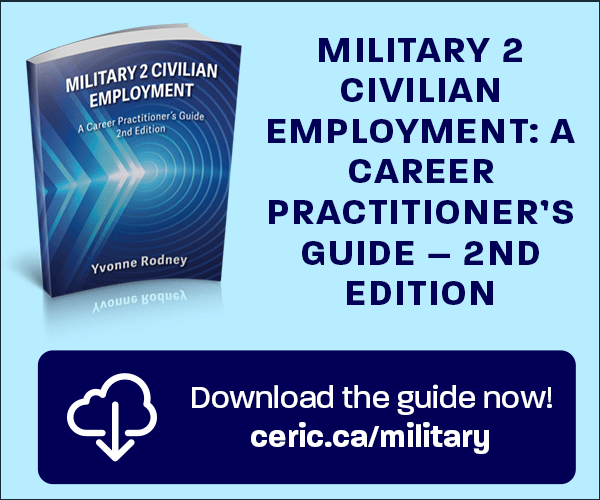Thriving in the New Millennium: Career Management in the Changing World of Work
Keywords:
millennium, world of work, career management, changeAbstract
Emerging theories in career development (e.g., planned happenstance), present specific individual characteristics as foundational to effective career management: continuous learning, financial management, flexibility, work-life balance, networking, optimism, persistence, planfulness, and risk-taking. In the present study, managers (N = 181) employed by a large Canadian organization were surveyed to identify whether these career management characteristics predicted either career success or job satisfaction. Optimism and flexibility were found to be the best predictors of career success, accounting for 12% of the total variance. Optimism, continuous learning, and planfulness were the best predictors of job satisfaction, accounting for 19% of the total variance.
References
ATEC (1999). Canadian standards and guidelines for career development: Draft 1. Ottawa, ON: National Steering Committee.
Bahniuk, M. H., Hill, S. E. K., & Darus, H. J. (1996). The relationship of power-gaining communication strategies to career success. Western Journal of Communication, 60, 358- 378.
Bar-On, R. (1997). EQ-i: BarOn emotional quotient inventory. Toronto, ON: Multi-Health Systems.
Baxter, D. (2000, May). An outline for strategic succession, retention, and recruitment planning. Paper presented at Working Wonders, the CACEE/CAFCE National
Conference 2000, Victoria, BC.
Blustein, D. L. (1997). A context-rich perspective of career exploration across the life roles. Career Development Quarterly, 45, 260- 274.
Bridges, W. (1997). Creating you & co.: Learn to think like the CEO of your career. Reading, MA: Addison Wesley.
Burke, R. J. (1999). Career success and personal failure feelings among managers. Psychological Reports, 84, 651-653.
Business Council of British Columbia. (1999). Generic skills - characteristics survey results: What are British Columbia employers looking for? [Brochure]. Vancouver, BC: Author.
Champy, J. & Nohria, N. (2000). The Arc of ambition: Defining the leadership journey. Cambridge, MA: Perseus Books.
Cole-Gomolski, B. (1998, December 14). Pay, hot tech block IT vets. Computerworld, 32(50), (p. 1,110).
Corporate Council on Education (1992). Employability skills profile [Brochure]. Ottawa, ON: Conference Board of Canada.
Csikszentmihalyi, M. (1997). Finding flow: The psychology of engagement with everyday life. New York: HarperCollins.
Csikszentmihalyi, M. (1990). Flow: The psychology of optimal experience. New York: HarperCollins.
DeVoe, D. (1998). Plans are key to success. Infoworld, 20(31), 75-76.
Gelatt, H. B. (1991). Creative Decision Making. Los Altos, CA: Crisp Publications.
Gottfredson, G. D. (1996). The assessment of career status with the Career Attitudes and Strategies Inventory. Journal of Career Assessment, 4, 363-381.
Griffith, C. (1998, January). Building a resilient workforce. Training, 54-60.
Hakim, C. (1994). We are all self employed: The new social contract for working in a changed world. San Francisco: Berrett-Loehler.
Hall, D. T. & Moss, J. E. (1998). The new protean career contract: Helping organizations and employees adapt. Organizational Dynamics, 26(3), 22- 37.
Hayes, F. (1999, January 4). ‘99 do’s and don’ts. Computerworld, 33(1), 8.
Hill, S. (1998). Taking your career in hand: A question of attitude? Business Information Review, 15(3), 164-171.
Holland, J. L. & Gottfredson, G. D. (1992). Career attitudes and strategies inventory: An inventory for understanding adult careers. Odessa, FL: Psychological Assessment Resources.
Joo, S. & Grable, J. E. (2000). Improving employee productivity: The role of financial counseling and education. Journal of Employment Counseling, 37, 2-15.
Kaye, B. L. (1997). Up is not the only way: A guide to developing workforce talent (2nd ed.). Palo Alto, CA: Davies-Black Publishing.
Kidd, J. M. (1998). Emotion: An absent presence in career theory. Journal of Vocational Behavior, 52, 275-288.
Kirchmeyer, C. (1998). Determinants of managerial career success. Journal of Management, 34, 673-692.
Krumboltz, J. D. (1991). Manual for the Career Beliefs Inventory. Palo Alto, CA: Consulting Psychologists Press.
Krumboltz, J. D. (2000). Planned happenstance: Constructing unexpected career opportunities. Keynote address presented at Building Tomorrow Today, the Sixth Annual Alberta Regional Consultation for Career Development, Edmonton, AB.
Krumboltz, J. D. (1998). Serendipity is not serendipitous. Journal of Counseling Psychology, 45, 390- 392.
Melamed, T. (1995). Career success: The moderating effect of gender. Journal of Vocational Behavior, 47(1), 35-60.
Metcalf, C. J. & Briody, E. K. (1995). Reconciling perceptions of career advancement with organizational change: A case from General Motors. Human Organization, 54, 417-428.
Mitchell, K. E., Levin, A. S., & Krumboltz, J. D. (1999). Planned happenstance: Constructing unexpected career opportunities. Journal of Counseling and Development, 77, 115-124.
Mitchell, L. K. & Krumboltz, J. D. (1996). Krumboltz’s learning theory of career choice and counseling. In D. Brown, L. Brooks, & Associates (Eds.), Career choice and development (3rd ed.), pp. 233-280. San Francisco: Jossey-Bass.
Moses, B. (1999). The good news about careers: How you’ll be working in the next decade. Toronto, ON: Stoddart.
Moses, B. (1995). The manager’s career coaching guide. Toronto, ON: BBM Human Resource Consultants.
Orpen, C. (1994). The effects of organizational and individual career management on career success. International Journal of Manpower, 15, 27-37.
Orpen, C. (1996a). Dependency as a moderator of the effects of networking behavior on managerial career success. Journal of Psychology, 130, 245-248.
Orpen, C. (1996b). The effects of ingratiation and self promotion tactics on employee career success. Social Behavior and Personality, 24, 213- 214.
Parasuraman, S., Purohit, Y., Godshalk, V. M., & Beutell, N. (1996). Work and family variables, entrepreneurial career success, and psychological well-being. Journal of Vocational Behavior, 48, 275-300.
Poehnell, G. & Amundson, N. (2000). CareerCraft. Manuscript in preparation.
Porter, S., Porter, K., & Bennett, C.(1998). Me, myself, and I, inc.: Ten steps to career independence. Manassas Park, VA: Impact.
Posen, D. B. (1998). Staying afloat when the water gets rough: How to live in a rapidly changing world. Toronto, ON: Key Porter Books.
Savickas, M. L. (1997). Career adaptability: An integrative construct for lifespan, life-space theory. Career Development Quarterly, 45, 247- 259.
Seligman, M. E. P. (1990). Learned optimism. New York: Pocket Books.
Shahnasarian, M. (1994). Decision time: A guide to career enhancement. Odessa, FL: Psychological Assessment Resources.
Simonsen, P. (1997). Promoting a Development Culture in Your Organization: Using career development as a change agent. Palo Alto, CA: Davies-Black.
Stevens, J. (1986). Applied Multivariate Statistics for the Social Sciences. Hillsdale, NJ: Lawrence Erlbaum Associates.
Turban, D. B. & Dougherty, T. W. (1994). The role of protégé personality in receipt of mentoring and career success. Academy of Management Journal, 37, 688-702.
Van Eck Peluchette, J. (1993). Subjective career success: The influence of individual difference, family, and organizational variables. Journal of Vocational Behavior, 43, 198-208.
Wack, P. (1985). Scenarios: Uncharted waters ahead. Harvard Business Review, 63(5), p. 72-89.
Watts, A. G. (1996). Toward a policy for lifelong career development: A transatlantic perspective. Career Development Quarterly, 45, 41-53.
Williams, E. N. Soeprapto, E., Like, K., Touradji, P., Hess, S., & Hill, C. E. (1998). Perceptions of serendipity: Career paths of prominent academic women in counseling psychology. Journal of Counseling Psychology, 45, 379-389.
Young, D. (1999, March 15). Hot skills and cold cash. CIO, 12(11), 36-46.

Downloads
Published
How to Cite
Issue
Section
License

This work is licensed under a Creative Commons Attribution-NonCommercial-NoDerivatives 4.0 International License.
















